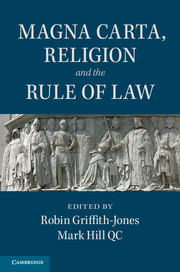Book contents
- Frontmatter
- Contents
- List of contributors
- Preface and acknowledgments
- I Introduction
- II The birth of Magna Carta and the spread of its principles
- III Comparative religious approaches to Magna Carta's rule of law
- 9 Quranic Magna Carta: on the origins of the rule of law in Islam
- 10 Justice in Islamic legislation
- 11 Shariʿa and the rule of law: preserving the realm
- 12 Democracy and the power of religion: some lessons from India
- 13 The still small voice of Magna Carta in Christian law today
- 14 Magna Carta, rule of law and religious diversity
- IV The contemporary inheritance of Magna Carta
- Appendix The Charters in translation
- Bibliography
- Index
12 - Democracy and the power of religion: some lessons from India
from III - Comparative religious approaches to Magna Carta's rule of law
Published online by Cambridge University Press: 05 May 2015
- Frontmatter
- Contents
- List of contributors
- Preface and acknowledgments
- I Introduction
- II The birth of Magna Carta and the spread of its principles
- III Comparative religious approaches to Magna Carta's rule of law
- 9 Quranic Magna Carta: on the origins of the rule of law in Islam
- 10 Justice in Islamic legislation
- 11 Shariʿa and the rule of law: preserving the realm
- 12 Democracy and the power of religion: some lessons from India
- 13 The still small voice of Magna Carta in Christian law today
- 14 Magna Carta, rule of law and religious diversity
- IV The contemporary inheritance of Magna Carta
- Appendix The Charters in translation
- Bibliography
- Index
Summary
The ongoing importance of Magna Carta lies chiefly in two principles. The first, derived from clauses 39–40, is the equality of all citizens under and before the law. The second, derived from the Security Clause, is a democratically realised restraint upon the power of the executive. Those in the modern secular West with an interest in religion and lawtend to have a personal investment in religion and so in the protection of religion by the legislature, executive and courts. Such advocates of religion find only doubtful comfort in those principles derived from the Charter. The cases involving exemptions, opt-outs and apparently special considerations for religious believers find the courts correcting a perceived imbalance that has historically obtained in favour of such believers. These are the very cases in which religious believers, already beleaguered, yet again feel victimised. Perspective is all.
In India, by contrast, two religions, which have coexisted for centuries, have vast numbers of adherents. The Indian census of 2001 counted 827 million Hindus, 138 million Muslims. Secularism is not the major force there that it is in the West. I will be concentrating on Hinduism and on two of its features in India which stand in uneasy relation to the principles derived from the Charter. The first is internal to Hinduism: the religion's lateral tolerance over against its vertical discrimination by caste. The second informs its political role: the readiness with which Hindu nationalist politics, empowered by large majorities, threatens the existence of social pluralism. In this chapter I reflect on the importance for India's democracy of the principles that came to early expression in the Charter, and on the dangers confronting those principles. Magna Carta was not a programme for modern democracy; its democratic credentials can clearly be overstated. But it laid the foundations upon which any sustainable democracy must be built.
Democracy's ‘providential process’
A paradox that lies at the heart of history is the changing nature of the past. Of course, the events of the past in themselves do not change, but their significance often does. In 1215, a handwritten document was sealed which recorded an agreement between the king and the baronial army; this was a merely local incident.
- Type
- Chapter
- Information
- Magna Carta, Religion and the Rule of Law , pp. 215 - 228Publisher: Cambridge University PressPrint publication year: 2015



